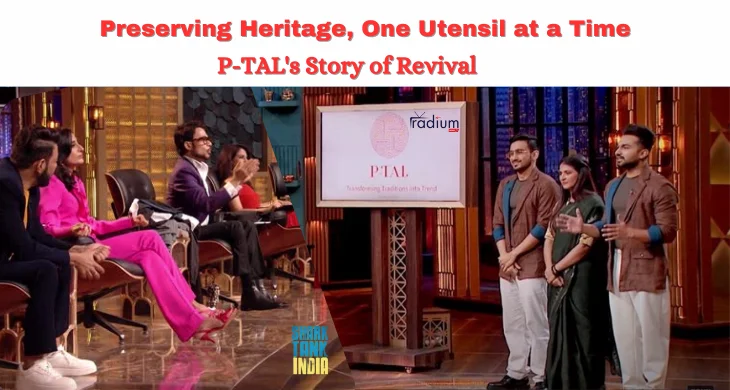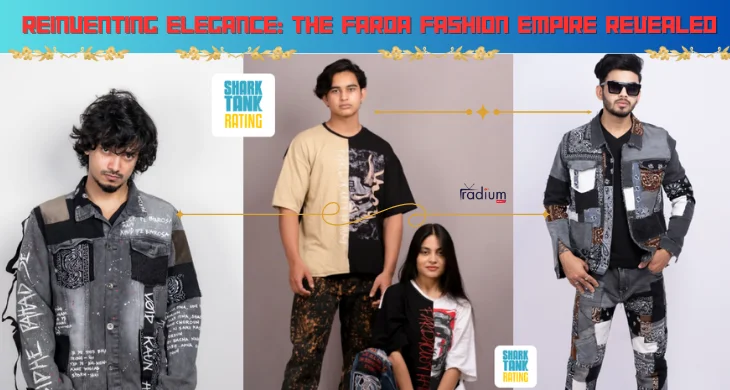In the bustling markets of India, where traditions often fade amidst the clamour of modernity, P-TAL stands as a beacon of hope. This innovative brand has taken upon itself the noble task of preserving India’s rich artisanal heritage, one utensil at a time. Born out of a college project and propelled by a passion for craftsmanship, P-TAL has revitalized the age-old Thatheras craft of Amritsar, Punjab—a tradition revered by UNESCO for its cultural significance. P-TAL isn’t just another brand; it’s a bridge connecting the past to the present. By blending traditional techniques with modern aesthetics, they’ve made ancient crafts relevant and accessible for today’s households. Their journey from a humble college project to being celebrated on Shark Tank India is a testament to their dedication and vision. Join us as we delve into the inspiring story of P-TAL’s revival and its mission to keep India’s artisanal legacy alive for generations to come.
The Genesis: A College Project with Heritage at its Core
P-TAL began its journey within the vibrant corridors of SRCC, where three enterprising individuals, Aditya Agrawal, Kirti Goel, and Gaurav Garg, envisioned a unique blend of tradition and modernity. They were captivated by the Thatheras craft, a time-honoured art form from Amritsar that had been fading into obscurity. Determined to breathe new life into this age-old craft, they embarked on a mission to integrate it into contemporary lifestyles, making it relevant and accessible to today’s generation.
Their innovative approach caught the attention of Shark Tank India’s panel of investors. In a memorable episode, P-TAL not only pitched its business model but also showcased the immense cultural significance of the Thatheras craft. The result was a resounding success, as they secured a remarkable investment of Rs 1 crore. This wasn’t just a financial boost; it was a powerful validation of their vision and a testament to the value of preserving India’s rich heritage.
The success of Shark Tank India sparked a broader conversation about the importance of cultural preservation. P-TAL’s story resonated with many, highlighting the potential of combining traditional craftsmanship with contemporary design. It served as a reminder that innovation doesn’t always mean moving away from the past; sometimes, it involves embracing it and reimagining it for the present and future.
Preserving Tradition Amidst Modern Challenges
Seeing the once-thriving Thatheras craft of Amritsar on the verge of extinction was a poignant moment for the founders of P-TAL. This UNESCO-listed craft, steeped in history and culture, was facing a decline, with fewer artisans practising the intricate art form and fewer households using the traditional brass, copper, and kansa utensils that it produced.
Feeling a deep sense of responsibility, the founders decided to take action. P-TAL was born not just as a business venture but as a mission to revive and sustain this precious heritage. They aimed to make the exquisite craftsmanship of the Thatheras accessible and appealing to modern households. By blending traditional techniques with contemporary designs, they created a range of products that resonated with today’s consumers, bridging the gap between the past and the present.
The impact of their efforts was profound, particularly on the lives of the artisan families they worked with. Before partnering with P-TAL, many of these families were struggling to make ends meet, earning as little as Rs 2,000 a month. However, with the resurgence of interest in the Thatheras craft and the popularity of P-TAL’s products, their fortunes began to change dramatically.
The artisans saw a significant increase in their earnings, with some even achieving monthly incomes of up to Rs 1.5 lakh. This remarkable economic transformation not only improved the living standards of these families but also instilled a renewed sense of pride and optimism within the community. P-TAL’s commitment to preserving and promoting the Thatheras craft had not only saved a dying art but had also revitalized an entire community.
Innovation in Health-Conscious Living
The onset of the COVID-19 pandemic brought unprecedented challenges but also sparked innovation and adaptation at P-TAL. With health and well-being becoming a top priority globally, the team saw an opportunity to showcase the unique Ayurvedic benefits of their products.
Traditional utensils made of brass, copper, and kansa, which had been used for centuries in Indian households, were known not just for their durability and beauty but also for their health benefits. These metals were believed to have antimicrobial properties and were used in Ayurveda for their healing properties. Recognizing the relevance of these ancient practices in the current health scenario, P-TAL decided to highlight these benefits to a wider audience.
The team began to re-imagine and repurpose these traditional utensils for modern-day use. They introduced designs that combined the timeless appeal of these metals with contemporary aesthetics, making them not only functional but also stylish additions to modern kitchens.
By blending ancient wisdom with modern design principles, P-TAL created a range of products that appealed to health-conscious consumers. These products were not just utensils; they were a blend of tradition and innovation, offering the best of both worlds.
This strategic pivot allowed P-TAL to cater to the growing demand for health-conscious living while also preserving and promoting the rich heritage of the Thatheras craft. It reinforced the brand’s commitment to sustainability, health, and cultural preservation, making P-TAL a name synonymous with quality, tradition, and wellness in households across India and beyond.
Strategic Focus on Customer Retention
Recognizing the unique characteristics of their niche market, P-TAL adopted a customer-centric approach that prioritized long-term relationships over quick sales. They understood that in a specialized market like theirs, where the initial engagement often starts with a modest purchase, nurturing these relationships could lead to more substantial and sustained business growth.
Rather than focusing solely on acquiring new customers, P-TAL placed a strong emphasis on retaining existing ones. They believed that a satisfied customer was not just a one-time buyer but could become a brand advocate, bringing in more business through word-of-mouth recommendations.
To foster these long-term relationships, P-TAL invested in providing exceptional customer experiences. They ensured that every interaction with the brand was memorable, from the quality of the products to the efficiency of their customer service. By consistently delivering value and exceeding customer expectations, P-TAL earned the trust and loyalty of its customers.
This customer-centric approach bore fruit, with P-TAL achieving an impressive repeat customer rate of 32%. This metric was a testament to the brand’s commitment to quality, customer satisfaction, and long-term engagement. It validated their belief that by focusing on building strong relationships with their customers, they could not only retain them but also turn them into loyal advocates for the brand.
In a market where competition is fierce and customer loyalty is hard-won, P-TAL’s focus on retention has set them apart. It has not only helped them maintain a steady revenue stream but also positioned them as a trusted brand in the minds of their customers, paving the way for sustainable growth and success.
WebEngage: The Catalyst for Growth
WebEngage’s Startup Program played a pivotal role in shaping P-TAL’s customer retention strategy. Recognizing the importance of retaining customers in a competitive market, P-TAL sought out tools and expertise to enhance their retention efforts. This is where WebEngage stepped in, offering a suite of technological solutions designed to streamline and optimize marketing campaigns.
With WebEngage’s platform, P-TAL gained access to a range of advanced tools that enabled them to segment their customer base effectively. This segmentation allowed P-TAL to tailor their marketing messages to specific customer groups, ensuring that each communication was relevant and personalized. By sending targeted messages to different segments, P-TAL was able to engage customers more effectively, increasing the likelihood of repeat purchases.
In addition to providing technological tools, WebEngage’s Startup Program also offered invaluable expert guidance. A dedicated customer success manager was assigned to P-TAL, providing them with personalized advice and best practices on how to design and implement effective marketing funnels. This hands-on support was crucial for P-TAL, especially as a lean startup with limited resources and expertise in retention marketing.
Furthermore, WebEngage’s program recognized the budget constraints that startups often face. To support P-TAL’s growth without straining their finances, the program offered exclusive perks, including free access to the WebEngage platform for up to six months. This gesture allowed P-TAL to invest in top-tier customer retention tools without incurring additional costs, helping them to maximize their return on investment.
Overall, WebEngage’s Startup Program was instrumental in empowering P-TAL to refine and optimize their retention strategy. By combining advanced technological tools with expert guidance and support, WebEngage enabled P-TAL to build stronger relationships with their customers, driving loyalty and sustainable growth for the brand.
Future Vision: Beyond Borders
P-TAL is not just content with making a mark in India; the brand has its sights set on the global stage. With a vision to introduce new products and reconnect with previous customers, P-TAL is on a mission to showcase the richness of Indian traditions and craftsmanship to the world. Aditya Agrawal, the CEO, dreams of a future where the distinctive brass, copper, and kansa utensils crafted by artisans in Amritsar find a place in kitchens across the globe.
This global ambition stems from P-TAL’s belief in the timeless appeal and utility of traditional Indian utensils. These age-old crafts are not just artifacts but functional pieces of art that bring a unique blend of aesthetics and functionality to culinary practices. By promoting these traditional utensils, P-TAL aims to foster a deeper appreciation for Indian heritage and craftsmanship among international audiences.
Moreover, P-TAL understands that the essence of Indian culture lies not just in its food but also in the tools and traditions associated with cooking. By advocating for the use of traditional utensils, P-TAL hopes to enrich the global culinary experience, offering a taste of Indian culture to kitchens worldwide. In Agrawal’s vision, P-TAL becomes a bridge that connects diverse cultures through the shared joy of cooking, making Indian craftsmanship an integral part of global homes.
Conclusion
P-TAL’s evolution from a simple college project to a global champion of Indian heritage showcases the perfect blend of innovation, tradition, and strategic thinking. This journey underscores the brand’s commitment to preserving and promoting India’s rich cultural heritage while adapting to modern needs. Through its unique approach, P-TAL has managed to captivate both domestic and international audiences, earning recognition as a symbol of artisanal excellence. As the brand continues to grow and innovate, it serves as a shining example of how traditional craftsmanship can find relevance and appreciation in today’s globalized world. P-TAL’s success story resonates as a powerful reminder of the timeless value and enduring charm of India’s age-old traditions, proving that with passion and perseverance, heritage can indeed find a place in the modern world.
Frequently Asked Questions
Que: What materials does P-TAL use?
Ans: P-TAL uses traditional materials like brass, copper, and kansa to craft its products.
Que: What recognition did P-TAL receive on Shark Tank India?
Ans: P-TAL secured a Rs 1 crore deal from all five sharks on Shark Tank India for its mission to revive the Thatheras craft, a tradition recognized by UNESCO for its cultural significance.
Que: What benefits did P-TAL highlight during the COVID-19 pandemic?
Ans: P-TAL emphasized the Ayurvedic benefits of its products, repurposing traditional utensils to promote health-conscious living.
Que: What is P-TAL’s focus on customer retention?
Ans: P-TAL emphasizes building long-term customer relationships over mere transactions, resulting in a commendable repeat customer rate of 32%.
Que: How has WebEngage helped P-TAL?
Ans: WebEngage’s Startup Program provided technological tools and expert guidance, enabling P-TAL to optimize its marketing efforts and enhance customer retention.



